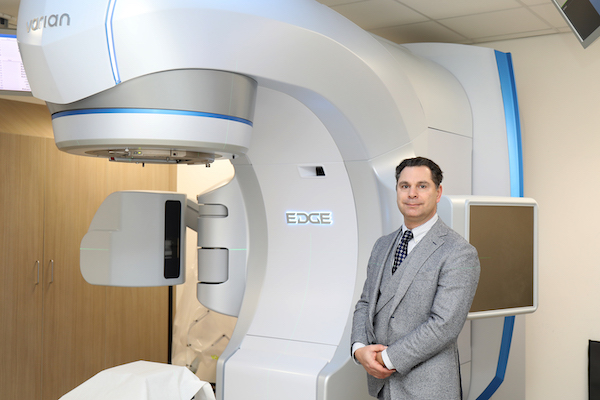Dr Andy Gaya is a Consultant Clinical Oncologist and one of the UK’s leading cancer doctors. He specialises in the treatment of gastrointestinal cancer, this means cancer that begins anywhere through the digestive tract, such as:
Cancer Screening & Diagnosis
Dr Andy Gaya will see patients who have already received a formal diagnosis of cancer and usually once they know their specific type of gastrointestinal cancer and its stage or grade. Dr Andy Gaya may organise additional screening to ascertain the exact sub type of cancer a person has and the ‘genetic fingerprint’ of their tumours, so he can develop a personalised medicine plan. More information about Dr Andy Gaya’s approach to individualised cancer treatment can be found here.

What screening methods are used on the NHS?
A person may suspect they have a digestive cancer if they have problems or pain during eating, if they notice a change in bowel habits or if they have pain in their abdomen. There are several tests that may be conducted if gastrointestinal cancer is suspected. Usually when people are worried, they speak to their GP, who conduct a physical examination to feel for any swollen or painful areas and will usually organise further tests or screening.
Screening is crucial for detection of cancer and blood tests are usually the first to be organised. While they can’t definitively diagnose cancer on their own, they provide valuable insights into a patient’s overall health and can indicate potential issues. For example, a Complete Blood Count (CBC) measures the levels of red blood cells, white blood cells, and platelets. It can help detect anaemia (common in gastrointestinal cancers due to bleeding). There are also blood tests which pertain to how a particular organ is functioning, like Liver Function Tests (LFTs) (to assess how well the liver is working and can detect abnormalities that might suggest liver involvement or metastasis).
If Bowel Cancer is suspected, a sample of poo may be sent off for analysis. This test is called Faecal Immunochemical Test (FIT) and it checks for hidden blood in stool samples which can be an early sign of bowel cancer. In the UK, the NHS Bowel Cancer Screening Programme sends kits to anyone aged over 54 a home test kit every two years. This programme is a vital tool in catching bowel cancer early, often before symptoms appear, which can make treatment more effective.
If cancer is suspected then a person is referred to specialist hospital-based teams to investigate further. Some common diagnostics for people with suspected gastrointestinal cancer are:
- Upper Endoscopy: A procedure to examine the oesophagus, stomach, and upper small intestine (the duodenum) for any signs of cancer with an endoscope (a camera that is passed down the throat of a sedated patient)
- Colonoscopy: If bowel cancer is suspected, this procedure involved passing an endoscope (a camera) into the bowel via the back passage to look for any signs of cancer
- Ultrasound: An abdominal ultrasound (a non-invasive way of viewing the organs through the tummy) is particularly useful for liver cancer. An endoscopic ultrasound (which is minimally invasive, but does require an endoscope is passed down the throat) is helpful for diagnosing pancreatic cancer
- Imaging Tests: Techniques like CT, MRI, and PET scans help visualise tumours and are organised for most people where there is a high suspicion of a gastrointestinal cancer
What screening methods are available privately?
Sometimes a GP or specialist does not suspect cancer and a person is not referred on for cancer screening. For some people they will be referred to hospital services, but if they are considered low risk they might have a long waiting time – some NHS patients are given appointments for screening which are a year away. If a patient feels strongly they would like further investigations, then they can organise cancer screening and tests privately.
Dr Andy Gaya recommends two highly effective approaches to private cancer screening:
Bupa Cancer Screening
- Bupa provides excellent generalised health screening including private gastrointestinal (GI) cancer screening services aimed at early detection, enabling timely intervention and better outcomes. Their screening options offer advanced and personalised assessments. For instance, they include non-invasive methods like faecal tests to detect hidden blood in stool samples and virtual colonoscopies for a thorough evaluation of the bowel.
- These services are tailored to your needs, with a focus on comfort and convenience. Bupa emphasises proactive health management, offering screening to individuals who may be at higher risk of GI cancers due to family history, lifestyle, or other factors. By leveraging modern diagnostic tools and expert medical insights, Bupa aims to provide peace of mind and empower people to take control of their gastrointestinal health.
Read more here: Private cancer screening tests | Bupa UK
TruCheck Cancer Blood Test
- TruCheck offers an innovative approach to cancer screening, focusing on early detection through advanced blood testing technology. Their service is particularly relevant for gastrointestinal (GI) cancers, as it identifies circulating tumour cells (CTCs) in the bloodstream—an early indicator of malignancy. This non-invasive test requires only a simple blood draw, making it a convenient and patient-friendly option. It can detect a variety of cancers, including gastrointestinal cancers like pancreatic cancer which can be hard to spot.
- The TruCheck test is designed to detect cancer at its earliest stages, even before symptoms appear, which can significantly improve treatment outcomes. By pinpointing the origin of the cancer, the test provides actionable insights that help guide further diagnostic and therapeutic steps. TruCheck is ideal for individuals seeking proactive health management, especially those with a higher risk of GI cancers due to family history or other factors.
Read more here: Trucheck™ cancer test from blood in healthy people | Trucheck™
Dr Andrew Gaya is a Consultant Clinical Oncologist and one of the UK’s leading cancer doctors specialising in the treatment of gastrointestinal cancer.

